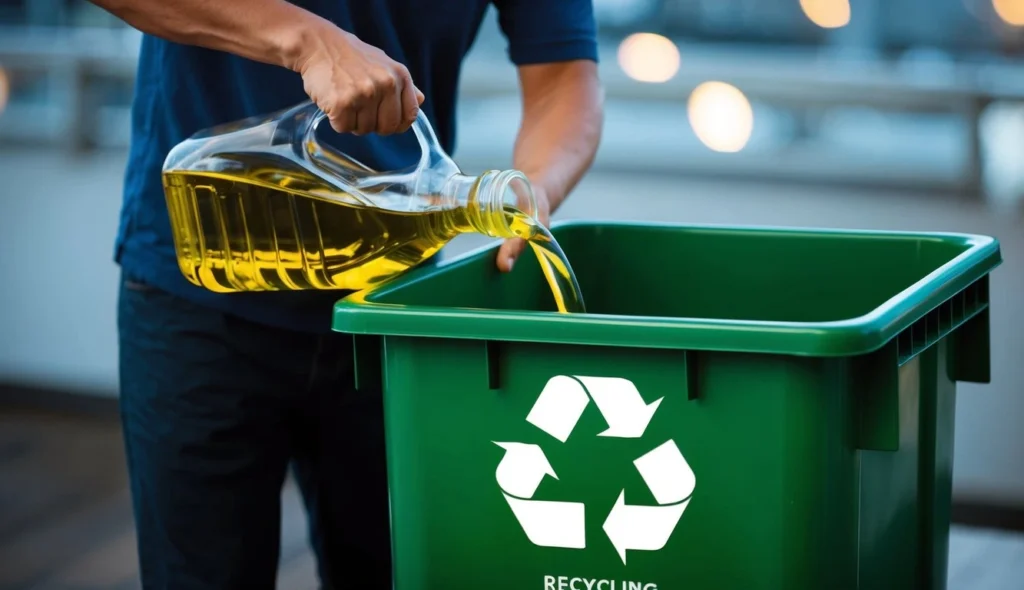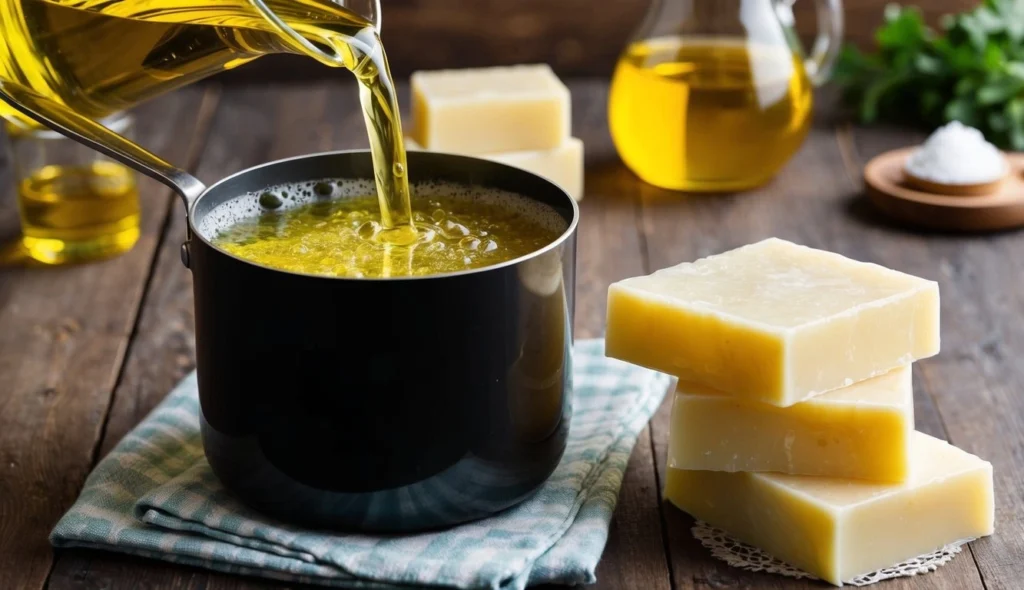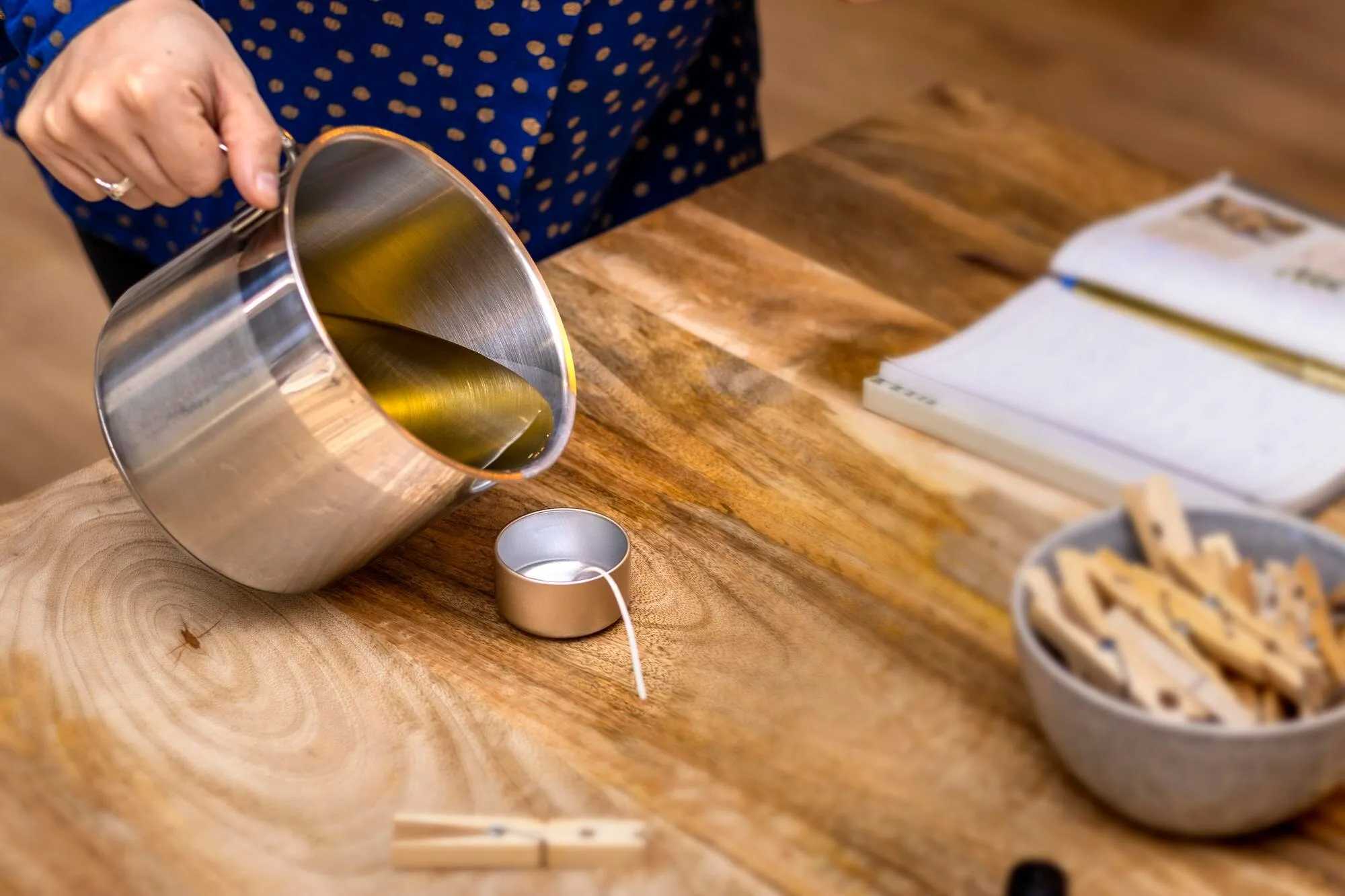Recycling just one gallon of used cooking oil can drop carbon emissions by 85%. This shows the big chance we miss when we pour it down the drain. The restaurant world throws away tons of oil yearly. This oil could power cars, heat houses, or feed animals if used wisely. Turning used cooking oil into something useful is key to saving our planet. It also sparks new eco-friendly ways to manage and recycle cooking oil.
Not many know how bad tossing cooking oil wrongly is for our pipes and nature. It causes more than just clogs; it leads to pollution that hurts our earth over time. So, making green choices in the kitchen is crucial. It’s not just about making great food; it’s about protecting our world.
Kitchens in America face a big decision. Companies like Mahoney Environmental lead the way in proper oil disposal. They also highlight how valuable this oil can be after its first use. So, what can you do with your used cooking oil and how it can become a valuable resource?
Understanding the Issue with Used Cooking Oil
As a kitchen chef or restaurant owner, dealing with used cooking oil is a big challenge. Knowing how to properly get rid of used oil is crucial. It keeps our drains clear and helps our kitchens run smoothly.
Understanding the Issue with Used Cooking Oil
The problem of how to handle used cooking oil is complex. If not disposed of right, it can clog both house and city sewers. These blockages, known as “fatbergs,” mix fats, oils, and grease with other trash.
For years, fatbergs have caused big problems at water treatment places. This shows why it’s important to be careful when getting rid of cooking oil.
Environmental Impact of Improper Disposal
Not disposing of oil correctly can hurt the environment a lot. Used oil can harm animals, pollute water, and add to greenhouse gas emissions. We must aim to dispose of oil in a way that protects nature and supports sustainability.
Recycling used oil with companies like Neste or MOPAC is a smart move. They help turn waste oil into biodiesel. This way, we’re avoiding harm and supporting a clean economy.
Neste works worldwide, turning used oil into renewable diesel. This cuts down greenhouse gases by up to 95% compared to regular fuels. MOPAC offers easy ways for restaurants to collect and recycle oil. They provide containers for safe oil storage.
In summary, dealing with used cooking oil wisely is crucial. It’s not just about following rules or managing our kitchens better. It’s about caring for our environment. By tackling this issue responsibly, we can make the food industry more sustainable and efficient.
Safe Disposal Methods

Being in the food service world, it’s key to throw away oil the right way. This is vital for your operation to run smoothly and for the earth’s well-being. Teaming up with trusted oil collection services makes sure recycling used cooking oil is good for both your business and the planet.
Partnering with Waste Management Services
Joining hands with waste management professionals like Mahoney Environmental can make disposing of used cooking oil easier. They offer special services just for food businesses. This ensures lots of oil are picked up efficiently and safely. Let’s look at how they assist:
- Regular scheduled pickups based on your business’s output and needs.
- Proper containers for storing used cooking oil, thereby avoiding spills and unsafe handling.
- Compliance assurance with local fat, oil, and grease (FOG) regulations to avoid fines.
- Conversion of collected oil into biodiesel, promoting sustainable practices.
Regulations and Compliance
Throwing oil away properly is a must for business and legal reasons. Many local laws are strict to protect the environment from harm due to oil disposal and recycling. Here are important tips:
- Never pour used cooking oil down the drain; this can lead to severe blockages and environmental damage.
- Utilize grease traps in your kitchen to prevent oils from entering the sewage system.
- Ensure that all employees are trained on the proper disposal methods for cooking oil.
- Keep records of oil collection and recycling as proof of compliance with local regulations.
Following these steps helps keep your kitchen running well. It also shows your place is doing its part for the planet. Properly managed, used cooking oil turns into biodiesel. This reduces our environmental impact and improves your community standing.
Recycling Used Cooking Oil

Running a restaurant brings many challenges. One big challenge is managing waste well. Used cooking oil is often seen as hard to get rid of. Yet, it has great potential for sustainability and saving money. I will share how to recycle used cooking oil effectively. This includes turning it into biodiesel and using recycling programs. These can help the environment and my business.
Biodiesel Production
Recycling used cooking oil into biodiesel is a great solution. Biodiesel is a clean, renewable alternative to traditional diesel. It uses the energy in used cooking oil. This method reduces our carbon footprint. It shows my commitment to taking care of our planet.
Process of Converting Oil to Biodiesel
The process starts with filtering out food bits and debris. Then, the clean oil goes through a chemical reaction called transesterification. In this process, the oil mixes with alcohol (like methanol) and a catalyst (often sodium hydroxide). This makes biodiesel and glycerol. Biodiesel burns cleaner and is better for the environment than fossil fuels.
Benefits and Challenges
- Benefits: Using recycled cooking oil for biodiesel cuts down harmful emissions. For restaurant owners like me, it’s a smart way to be eco-friendly and manage waste.
- Challenges: But, it’s not easy. Making good biodiesel needs high standards. Collecting and storing lots of used cooking oil is hard. Also, keeping the quality consistent is key to making biodiesel that meets industry specs.
Industrial Applications
Recycled cooking oil is used in many ways across industries. It goes into making bio-lubricants, animal feed supplements, and cosmetics. By joining used oil recycling programs, I help in making biodiesel. I also support a circular economy where waste has value.
Learning about these options encourages me to add these practices to my restaurant. By recycling used cooking oil into biodiesel, I help keep the environment clean. This turns waste into a resource that can power vehicles and heat homes. It’s a step towards a sustainable future, one batch of used cooking oil at a time.
Reusing Cooking Oil

As chefs and restaurant owners, we constantly look for ways to use kitchen resources wisely. Reusing cooking oil can help save the environment and cut costs. Let’s look at which oils are best for reusing and the important safety tips to remember.
Types of Oil Suitable for Reuse
- High Smoke Point Oils: Oils like canola, peanut, and sunflower oil are perfect for reusing because they can handle high temperatures well.
- Minimally Used Oils: Oils that have fried items like veggies or chips can be reused more often. This is because they don’t break down as quickly as oils used for foods with batter.
Safety and Health Considerations
To ensure the reused cooking oil is safe, follow these important steps:
- Cool and Strain: Let the oil cool down completely first. Then, strain it with a fine mesh to get rid of food bits that can cause spoilage or mold.
- Storage: Keep the used oil in a container that blocks light. Store it at room temperature or in a cool, dark place to stop it from going bad.
- Monitor Quality: Always check the oil for any changes in how it looks, smells, or feels. Stop using it if it foams a lot, smokes, or smells bad.
Using these tips for reusing cooking oil can help your kitchen run better. Plus, it helps you stick to health rules.
Environmental and Economic Benefits

Responsible upcycling of cooking oil is vital for its disposal and our planet. It also brings big economic benefits. By looking into these pros, we see its role in cutting down waste and supporting clean energy.
Reducing Waste in Landfills
Every year, mismanaged cooking oil worsens landfill waste, harming the environment. Yet, sustainable waste solutions can greatly lessen oil-related pollution. Let’s look at how:
- Keeping used cooking oil out of landfills stops harmful leaks into the ground and water.
- Tight recycling rules reduce soil and water pollution.
- Turning used cooking oil into animal feed or for industrial use lessens organic waste in dumps, aiding the planet.
Supporting Renewable Energy
Shifting to renewable energy is key in fighting climate change. Used cooking oil is critical in this change. Let’s see its effects:
- Turning cooking oil into biodiesel reduces our reliance on fossil fuels, cutting greenhouse gas emissions.
- Even very dirty used oil can now be made into clean-burning, high-quality biodiesel.
- Biodiesel from used cooking oil can cut vehicle and industry emissions by up to 90%, a big step for our environment.
Additionally, recycling cooking oil doesn’t just save resources; it drives economic growth. It creates jobs in fields like engineering and marketing.
Conclusion
Let’s wrap up our deep dive into the world of cooking oil. It’s crucial we adopt practices that are kind to our planet. This includes eco-friendly ways to dispose of and reuse cooking oil. Now, we see used cooking oil not just as waste, but as a chance to do better for our earth.
Being able to recycle cooking oils, which are 100% recyclable, is a game-changer. It turns both restaurant operations and home kitchens into champions of sustainability. This shows how every step towards recycling can pave the way for a greener future.
Summarizing the Solutions
There are many smart ways to handle cooking oils, from turning them into compost to making biodiesel. In the US, places like GE Biofuel in Rock Hill, SC, are making a difference. They turn used cooking oil into biodiesel. This helps cut down carbon emissions significantly, making the food industry more eco-friendly.
Each gallon of cooking oil we reuse or recycle means less waste ending up in landfills. It’s a strong reminder of why we must keep up these good practices. It’s not just about making a small change. It’s about making a big impact.
Encouraging Responsible Practices
The path cooking oil takes, from frying our food to powering vehicles with biodiesel, is truly incredible. This process is efficient and shows how we can care for our planet. And the uses go beyond just energy. They extend to polishing leather and boosting pet health.
These varied uses show how important it is to manage cooking oil correctly. The benefits are huge, not just for us but for our communities and the whole planet. So, I urge all my fellow restaurateurs and chefs to join in this effort. Together, we can lead our industry to be a model of both economic and environmental sustainability.
FAQ
How to dispose of cooking oil after frying?
Make sure the used oil is cool enough to pour into another container intended for disposal. Pour the used oil into a sealable, disposable container such as a plastic bottle, take-out boxes, or an empty milk carton. Seal the container properly and tightly. Include the container in your food waste bin for disposal. For more details, visit Actenviro’s guide on disposing of cooking oil safely.
How to dispose of cooking oil in Canada?
In Canada, cooking oil disposal guidelines vary by region. Typically, you can take the oil to designated recycling or disposal centers. Learn more at Metro Vancouver’s guide on fats, oils, and grease disposal.
How do you reuse cooking oil after frying?
If you are planning to reuse the oil, strain it through a cheesecloth or sieve to remove food particles. Store the used oil in a sealed and light-proof container for up to three months. For best quality, refrigerate the used frying oil. More information can be found at USDA’s guidelines on reusing cooking oil.
How can I properly dispose of used cooking oil?
To properly dispose of used cooking oil, first let it cool and transfer it into a sealable container. You can then take it to a local recycling center or collection point that accepts cooking oil. Alternatively, some municipalities recommend sealing it in a container and disposing of it with your regular trash. Recycling, however, is the more environmentally friendly option.
Can used cooking oil be recycled or repurposed?
Yes, used cooking oil can be recycled or repurposed. It can be converted into biodiesel, a renewable energy source, or used in the production of soaps, animal feed, and industrial lubricants. Recycling used cooking oil helps reduce environmental impact and promotes sustainability.
Resources
https://www.rts.com/blog/how-to-recycle-cooking-oil/
https://www.webmd.com/food-recipes/eco-friendly-ways-dispose-oil








